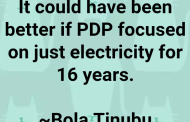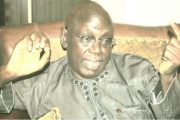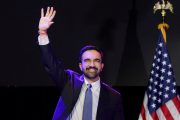International institutions entered the post-Cold War world on a controversial note. As early as 1994, Prof John Mearsheimer had published his essay ‘The false promise of international institutions’ in which he doused liberal institutionalists’ optimism, saying all forms of liberal institutionalism had a problem of causal logic and had little promise of promoting stability in the era. It was a damning outing although no one was expecting a structural realist such as Mearsheimer to grant much concessions to liberal institutionalists. But Mearsheimer’s gaze was exclusively on the Western world and he had, not surprisingly, nothing much to say in relation to Africa, for instance.
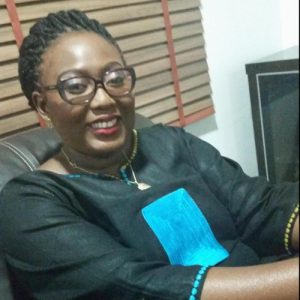
Mrs Angela Odah, Head of Rosa Luxembourg Office in Nigeria
Hence the relief when a King’s College London academic situated the Economic Community of West African States (ECOWAS) differently, calling ECOWAS a story in continental “firsts” in the area of regional peacekeeping. For Prof Olonisakin, ECOWAS is the first on the continent to undertake a major peacekeeping mission (beginning with the deployment of ECOMOG in Liberia in 1990) thereby preceding other regional organisations in terms of developing a ‘workable security management mechanism’ in the face of a complex emergency in the post-Cold War world. as far as Intervention can recall, Prof Olonishakin is absolutely correct because NATO in Bosnia transgressed more core principles than any transgressions traceable to ECOWAS in Liberia and later in Sierra Leone. But that is probably a matter for another day.
Mearsheimer’s influence in global academia meant that, although, international institutions carry the query of false promise, Prof Olonisakin’s assessment of ECOWAS satisfied the African specificity regarding international institutions in post-Cold War politics. What that has meant is that ECOWAS at 50 was an attractive kettle of fish for students of international politics, INGOs, think tanks, the member states and the policy mill, offering them a unique opportunity for deepening comprehension of international institutions from the African standpoint. The number of seminars, symposia and similar activities that greeted ECOWAS at 50 across Nigeria, for example, was thus instructive, irrespective of how critical those activities were in temperament.
Looking at the exchange that took place at the one of them by Rosa Luxembourg Foundation in Nigeria shows there had been a lot of fireworks. At the least, Luxembourg Foundation brough a resource person with the presence of mind to add value to the debate on international institutions in the post-Cold War. Prof Jibrin Ibrahim who delivered the Keynote address did so by posing an overarching question of how the people, the real owners of ECOWAS, could take over their organisation from the power elite, particularly the Heads of State, as a precondition for realizing the ideals of ECOWAS?
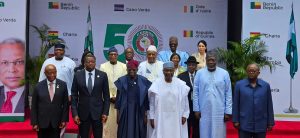
Towards the democratic march in ECOWAS
Prof Ibrahim is not plotting exclusion or marginalization of Heads of State but democratisation of the organisation in the image of the people. In other words, he puts on the table a radical populist gaze on international institutions, something completely different from what the dwindling tribe of John Mearsheimer’s structuralism across the world or their counterpart under Prof Robert Keohane are offering. Notwithstanding Prof Jibo’s rather liberal democratic entry point in the understanding of the spectacular successes (and failures too) of ECOWAS within 50 years, he ends up with the rich promise of international institutionalism that is neither about which of the state or institutions can keep world peace but about what is this thing called peace. And he offers his own notion of peace in terms of a people’s ECOWAS.
What Rosa Luxembourg Foundation Office in Nigeria has, therefore, done through a resourceful resource person is to have provoked a debate. Students of structural realism such as Mearsheimer can advance to be recognised with their own position. So also students and practitioners of liberal institutionalism as well as activists of radical populist internationalism.
Such an explosive debate would still fit absolutely within the spirit of democracy. It is reasonable to fear that Heads of State would be advantaged in such a debate because they have more resources, better trained intellectuals and the power of office. It will still be democracy if they mobilise better and win the debate but even if that were to happen, ECOWAS would still never be the same again. Those who would be controlling it thereafter would know that they have to be winning the debate periodically to remain in control unlike now when all that the Heads of State need do to frustrate whatever they do not want is simply to masticate it behind the scene.
The Keynote speaker’s stuff was not just what happened at Rosa Luxembourg’s November 4th, 2025 ‘ECOWAS @ 50’ event but that is the dimension that is new, beyond rule of the thumb and most serious. It is considered that the routine protocols, faces and speeches that also took place at the event can be shoved aside for grater attention to the arrival of populist reason in international institutionalism, not from Europe or North America but from Africa and from Nigeria!
Intervention would argue that even if the Heads of State in ECOWAS fear radical populism, they should still be happy and proud that something authentically West Africa is on the table which they should own and promote.
Adagbo Onoja reporting for Intervention






